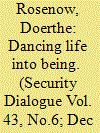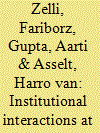|
|
|
Sort Order |
|
|
|
Items / Page
|
|
|
|
|
|
|
| Srl | Item |
| 1 |
ID:
120000


|
|
|
|
|
| Publication |
2013.
|
| Summary/Abstract |
A variety of scholars in critical security studies have recently argued that new modes of neoliberal world order are influenced by the emergence of complexity theory in the sciences, which manifests itself, for example, in the discourse of resilience. By contrast, this article aims to point at the number of governmental discourses and practices in which 'old' understandings of order are persistent. What will be argued is that such a set of practices can be found in the regulation of genetically modified organisms (GMOs), in which the dominant approaches and strategies still rely on an understanding of life that is bound to a more traditional episteme that expresses the desire for predictable management with clearly controllable effects. The article then moves on to discourses of resilience to show how they are equally characterized by this episteme. In unravelling the struggle that exists between 'old' and 'new' epistemes, the article aims to elaborate on the potential of complexity discourses for challenging particular governmental rationales, manifested in both the resilience context and the GMO controversy.
|
|
|
|
|
|
|
|
|
|
|
|
|
|
|
|
| 2 |
ID:
117946


|
|
|
|
|
| Publication |
2013.
|
| Summary/Abstract |
This article argues that institutional interactions that cut across the domains of trade and environment are embedded in overarching norms that shape their evolution and impact. In making this argument, it analyzes three cases of such interactions within the climate change and biosafety regime complexes: those relating to trade-related climate policies and measures, forest carbon sinks, and trade in genetically modified organisms. The analysis highlights the dominance of liberal environmentalism (a set of global norms promoting economic efficiency and environmental improvements through market-based mechanisms) in shaping institutional interactions within these regime complexes, even as liberal environmentalism is contested by key actors. This, in turn, has implications for effective management of institutional interlinkages within regime complexes in global environmental governance.
|
|
|
|
|
|
|
|
|
|
|
|
|
|
|
|
| 3 |
ID:
134327


|
|
|
|
|
| Publication |
2014.
|
| Summary/Abstract |
Globally, advances in the life sciences are viewed in a positive light, as contributing to improvements in public health, agricultural, and economic development. At the same time, some of these advances can generate disquiet, misunderstanding, and even suspicion in diplomatic and security communities if they fall, for example, in the categories of dual use research, genetically modified organisms (GMOs), or synthetic biology. Examples from each of these categories are often raised in diplomatic venues ranging from multilateral discussions such as under the Biological and Toxin Weapons Convention (BTWC) to a host of international meetings. In general, the concerns have a biosecurity or biosafety tenor. They emanate from fears that rogue governments or terrorists can misuse enabling technologies or that accidental release of pathogens or GMOs can occur and cause human or environmental damage
|
|
|
|
|
|
|
|
|
|
|
|
|
|
|
|
|
|
|
|
|